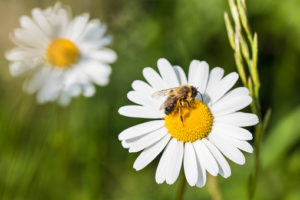Bee Sting Allergies

April showers bring May flowers, and with flowers also bring bees. Flowers attract bees because the nectar and pollen from the flowers can be collected for food. Bees have a major role in helping plants and flowers grow by helping them pollinate. While collecting food from the flowers, bees can carry pollen from one plant or flower to another. The food that bees collect is honey, and is something that many of us enjoy! Even though bees serve multiple purposes, they are not always welcomed. Not only does bee stings hurt, but also many people are allergic to them.
Why Bees Sting
One of the main reasons why bees, especially honeybees, sting is because they are defending their colony and protecting their hive. Bees will also sting to save their honey, which is their food source. When a bee detects harm, they release pheromones to alert other bees to become defensive and sting.
Bee Sting Allergy Symptoms
Many people are allergic to bee stings and may even have severe anaphylactic reactions if they are stung. For most people a bee sting hurts for a few hours and then resolves. Some people may experience severe swelling at the site of the bee sting. People who are allergic may have more serious reactions. Concerning symptoms of bee stings to watch for include:
- Itching, hives, or swelling over a large area of your body and not just where you were stung
- Swelling of the face, throat or tongue
- Issues with breathing
- Dizziness
- Nausea
- Stomach cramps or diarrhea
Any of these symptoms warrants the use of epinephrine. If you know you are allergic to bee stings, it is important to always carry at least one epinephrine auto-injector with you.
Ways to Prevent Bee Stings
It is best to avoid bees and their hives if you are allergic to them. Stay away from using sweet fragrances in your hair spray, lotion, perfume, and soap. Don’t wear bright colored clothes or floral patterns. Be careful with food such as an opened soda can. Hold still if a bee lands on you because rapid movements can startle the bee into stinging. Wear shoes to protect them from potentially stepping on bees.
If you are interested in learning more about your bee sting allergy, Allergy, Asthma, and Immunology Medical Group can help. Call us at 805-658-9500 for an appointment with our doctors to help manage your allergy, from minor to serious reactions. Don’t let bees get in the way of you enjoying all the May flowers this spring!



